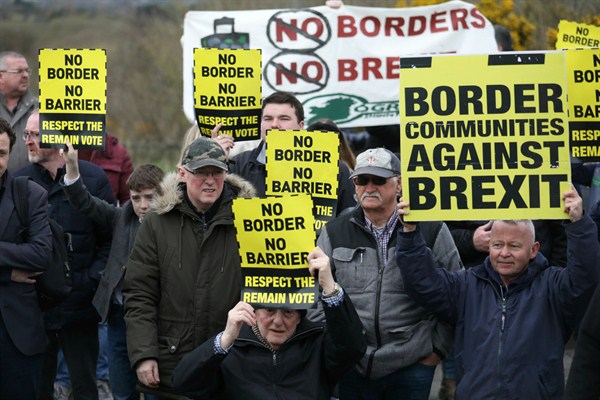While the recent six-month extension of the deadline for Britain’s withdrawal from the European Union has delayed any Brexit fallout, for now, it has not alleviated renewed tensions in Northern Ireland over the possible return of a hard border with the Republic of Ireland. The EU’s recent receptiveness to a so-called Irish backstop in any Brexit agreement that would prevent the reintroduction of a hard border was nevertheless a good sign for Belfast, given that during the 2016 Brexit referendum, 56 percent of Northern Irish voters opted to remain in the EU. Irrespective of whether that Irish backstop is implemented if an eventual deal is struck between London and Brussels, Brexit has had an unintended impact in Ireland, reigniting discussions of Irish reunification. With demographic shifts in both Northern Ireland and the Republic of Ireland, along with increasing frustrations with the entire Brexit process, the stage could be set for a future referendum on Irish unity.
In April 1998, the Good Friday Agreement, also known as the Belfast Agreement, formally ended the longstanding ethnoreligious conflict between Catholic Nationalists and Protestant Unionists in Northern Ireland, as well as between paramilitary and British government forces. Nearly 30 years of fighting during “the Troubles” claimed the lives of more than 3,500 people, saw the rise of the Irish Republican Army as a leading international terrorist organization, and resulted in a massive struggle between Catholics and Protestants in Northern Ireland, particularly in Ulster. The Good Friday Agreement provided for the removal of British troops from conflict zones, lifted border checkpoints, and created a power-sharing arrangement allowing for direct rule from Westminster in conjunction with a Northern Ireland Assembly in Belfast and a North-South Ministerial Council reinforcing relations between Northern Ireland and the Republic of Ireland. Among other terms, the agreement also allowed for the possibility of a referendum on the reunification of Ireland.
Since its passage, the Good Friday Agreement has generally kept the peace. Violence has decreased substantially, although both nationalist and unionist extremist groups have carried out intermittent attacks. Power-sharing arrangements were slow to take root and resulted in a suspended Northern Ireland Assembly and direct rule from Westminster until 2007, when Sinn Fein’s Martin McGuinness and the leader of the Democratic Unionist Party, Ian Paisley, finally agreed to put aside their differences.

